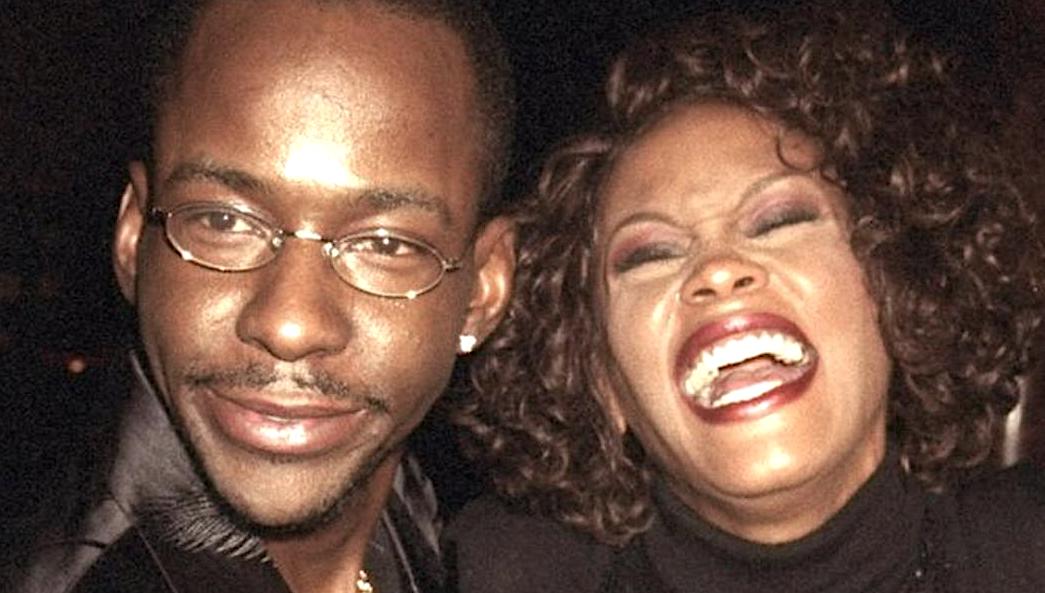It was only a year ago that Nick Broomfield’s Whitney: Why Can’t I Be Me was released. Kevin Macdonald’s new documentary about the rise and hideous demise of one of pop’s greatest stars was made with the blessing of her family, but doesn’t shed significantly more light than the Broomfield version. In fact a couple of Broomfield’s interviewees who don’t appear here were more illuminating than some who do.
It’s true that this time Whitney’s mother Cissy is interviewed, though she talks about the young Whitney (or Nippy, as she was always known within the family) with a great future ahead of her rather than delving into the murky depths of her marriage to Bobby Brown (pictured below) and its accompanying descent into booze-and-drugs purgatory. There’s also an “I-taught-her-everything-she-knew” vibe about Cissy which suggests that she never got over the fact that she didn’t achieve anything like the hallowed status of her daughter. Despite Whitney’s continued devotion to her family, they look much more like a ball and chain than a blessing. Her brother Michael has spoken before about how he introduced his sister to drugs, and he does so again here, adding for good measure that Bobby Brown was a mere lightweight in the drug abuse stakes compared to himself and his brother Gary. Meanwhile Whitney’s father John is depicted as a hustling exploiter who wanted to control Whitney’s career, and who, having helped himself to his daughter’s money, sued her for $100m in 2002 (he lost). Brown also makes an appearance, but refuses to discuss drug abuse (prompting the unseen interviewer, which sounds like Macdonald himself, to comment that this might render the interview somewhat pointless).
Despite Whitney’s continued devotion to her family, they look much more like a ball and chain than a blessing. Her brother Michael has spoken before about how he introduced his sister to drugs, and he does so again here, adding for good measure that Bobby Brown was a mere lightweight in the drug abuse stakes compared to himself and his brother Gary. Meanwhile Whitney’s father John is depicted as a hustling exploiter who wanted to control Whitney’s career, and who, having helped himself to his daughter’s money, sued her for $100m in 2002 (he lost). Brown also makes an appearance, but refuses to discuss drug abuse (prompting the unseen interviewer, which sounds like Macdonald himself, to comment that this might render the interview somewhat pointless).
What makes the Houston story particularly depressing is the gulf between her irresistible young self, fizzing with energy, cheekiness and humour and with the world delighted to prostrate itself at her feet, and the stumbling and emaciated shadow of herself that she became. Macdonald has included extracts from the notorious TV interview with Diane Sawyer in which she admits to taking most of the illegal drugs known to mankind, while pointing out rather haughtily that “crack is cheap – I make too much money to ever smoke crack”.
 He doesn’t mention how Houston was axed from the 2000 Academy Awards show because she couldn’t remember what she was supposed to sing, but he does have one major bombshell to deliver, which is the revelation that Whitney was sexually abused as a child by her cousin Dee Dee Warwick, Dionne’s sister. However, beyond presenting the fact, the film doesn’t draw any particular conclusions from it or link it to coverage of her possibly lesbian relationship with close friend Robyn Crawford (who isn’t interviewed). We do get Whitney’s hairdresser though, who insists that the star was energetically heterosexual.
He doesn’t mention how Houston was axed from the 2000 Academy Awards show because she couldn’t remember what she was supposed to sing, but he does have one major bombshell to deliver, which is the revelation that Whitney was sexually abused as a child by her cousin Dee Dee Warwick, Dionne’s sister. However, beyond presenting the fact, the film doesn’t draw any particular conclusions from it or link it to coverage of her possibly lesbian relationship with close friend Robyn Crawford (who isn’t interviewed). We do get Whitney’s hairdresser though, who insists that the star was energetically heterosexual.
Houston’s fans probably already know as much about the story as they want to, so it’s not entirely clear who the film is aiming at, especially since it’s somewhat frugal with show-stopping performance footage (the best bits are Whitney singing the National Anthem at the Superbowl and performing for Nelson Mandela in Johannesburg in 1994). Are there enough connoisseurs of notorious pop deaths to fill the multiplexes?















Add comment